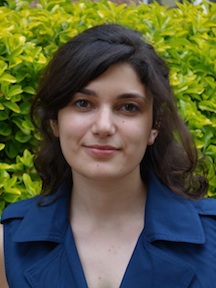By Amelia Harrington
Laure Astourian, French film scholar and previous winner of the Walter J. Jensen Fellowship, has been awarded the 2016 Mary Isabel Sibley Fellowship in French Studies. Having recently completed her PhD at Columbia University, Astourian is preparing a book manuscript based on her dissertation, “Outside the Metropolitan Frame: The Nouvelle Vague and the Foreign, 1954-1968.”
“Having recently defended my dissertation, I find myself once again at the early stages of a long-term project,” she explains. “The support of Phi Beta Kappa and the Sibley Fellowship Committee is extremely motivating.” The Fellowship’s $20,000 stipend will allow her to concentrate exclusively on her writing and to continue vital archival research in France.
Astourian’s love for cinema emerged at an early age. She voraciously watched films (especially French films) as a teenager, renting several each week. Then, she recalls, “as an undergraduate at UC Berkeley, I worked as a ticket-seller and usher at the Pacific Film Archive, choosing my hours based on the films I wanted to see.” She notes that working at the Pacific Film Archive was “as much a part of [her] film education as taking film studies courses.” When Astourian earned her dual Bachelor of Arts in French and Film Studies she graduated with high distinction, becoming a member of Phi Beta Kappa in 2008.
The same keen interest in film that she had in high school and as an undergraduate fuels her current work, and Phi Beta Kappa played, and continues to play, a critical role in cultivating her ambition. The Jensen Fellowship, which she was awarded in 2012, allowed her to undertake archival research in the early stages of developing her dissertation. She was able to connect her two passions, literature and film, in a way she did not expect.
“The time I spent in Paris as a Jensen Fellow led me to develop a third academic interest, cultural history, which served to ‘gel’ the [other] two,” Astourian recalls. “I became more attuned to the context—social, political, historical—within which works were produced, promoted, and received. In the past, I privileged close reading (which I still consider extremely important); now I am equally attentive to the genesis of works and to the context of their production.”
Astourian’s research concerns an area of French cinema largely unexplored. Until now, Nouvelle Vague, or New Wave, filmmakers have been known primarily for their treatment of film as an art form, emphasizing aesthetics over politics. In her dissertation, she challenges this paradigm, exploring the ways Nouvelle Vague filmmakers, including Jean-Luc Godard, Alain Resnais, Jean Rouch, and Agnès Varda, engaged with the evolving politics of the time. Through close study of film and its surrounding criticism, Astourian demonstrates that the films of the Nouvelle Vague are in fact characterized by a complex relationship between an inward and outward gaze: inward, toward metropolitan France and especially Parisian life, and outward, to the changing international landscape. This duality, she claims, is the expressive manifestation of a shifting French national identity.
In the late 1950s and early 1960s, France experienced a period of transformation. French colonialism was slowly dismantled as two French colonies, Indochina and Algeria, fought for independence. As the United States rose to the status of a world power, the international balance of power was altered, with France’s influence diminishing over time. Astourian’s dissertation shows how these dynamic national, colonial, and international shifts are reflected in films of the Nouvelle Vague.
Astourian will continue her archival research at the Bibliothèque du film and the Bibliothèque nationale de France in Paris, the Institut Mémoires de l’édition contemporaine in Caen, and the CNC French Film Archives in Bois d’Arcy. By consulting screenplays, letters, film reviews, and promotional materials, she plans to “build an image of the context in which [Nouvelle Vague] films were made,” and “situate them and their reception in the framework of intellectual and cultural history,” she asserts. The archives are useful for adding “texture and detail” to her argument, she explains, but they also present a unique opportunity for Astourian to interact physically with her subject, which provides powerful inspiration.
“Handling fragile bits of newspaper reviews and invitations to openings at the Cinémathèque Française also gives me a strong sense of the time, place, and spirit in which these films were made,” she reflects. “It’s as if I were touching history.” The act of archival research is, for Astourian, “akin to a philosophy of life.”
“It means understanding and accepting that we can never really know or understand everything, but we can still create something original out of the fragments that we do have,” Astourian explains. “Of course, with intellectual agency and creativity comes responsibility, which is why close reading is so important. It forces us to anchor our claims in evidence; in other words, it keeps us in line!”
Amelia Harrington is a junior at Randolph College majoring in English literature and dabbling in everything else. Randolph College is home to the Delta of Virginia Chapter of Phi Beta Kappa.




